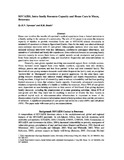HIV/AIDS, intra-family resources capacity and home care in Maun, Botswana

View/
Date
2005Author
Ngwenya, B.N.
Butale, B.M.
Publisher
Botswana SocietyType
Published ArticleMetadata
Show full item recordAbstract
Home care involves the transfer of a patient’s medical supervision from a formal institution to a family setting in the context of a community. The aim of this paper is to assess the resource
capacity of families to provide immediate home care to HIV/AIDS related chronically or
terminally ill member/s in Maun in Ngamiland District. Data for the study was obtained through
cross-sectional interviews with 61 care-givers. Ethnographic methods were also used: these
included informal interviews with key informants, unobtrusive participant observation, and
narratives of individual and family life experiences. Data collection focused on assessing family
resource capacity to access three forms of capital, namely social, productive and produced. Issue focus analysis on qualitative data, and descriptive frequencies and cross-tabulations on
quantitative data were carried out.
Generally, care-givers reported receiving non-material support from multiple sources. These included moral support from close family members, especially their own children,
siblings, parents and spouses, and less from parents’ in-law and their extended family. The
threshold of care-giving resource demands could either fragment the family unit, on precipitate
‘enclave-like’ or ‘disengaged’ co-existence or passive aggression. On the other hand, caregiving
resource demands may enhance mutual obligation and shared responsibility among
family members. A high level of tolerability tends to reduce vulnerability and facilitate pooling
limited resources in ways that enhance family capacity. Conversely, adversarial intra-family relations compromise the ability of a family to mobilize its resources. About 70% of care-givers
were dependent on non-farming activities as their source of livelihood. Care-giving depletes
family resources, including the abandonment of income generating activities. About 81% of care-givers said that they could not do anything to recover or reverse the loss. Access to
produced capital such as telecommunication infrastructure is important in terms of the dissemination of public education information aimed at helping reduce risks and the prevention
of infection. A significant proportion of care-givers had access to a radio (60%) and cell-phone
(48%). The paper ends with some policy recommendations.
Collections
- Research articles (ORI) [270]
